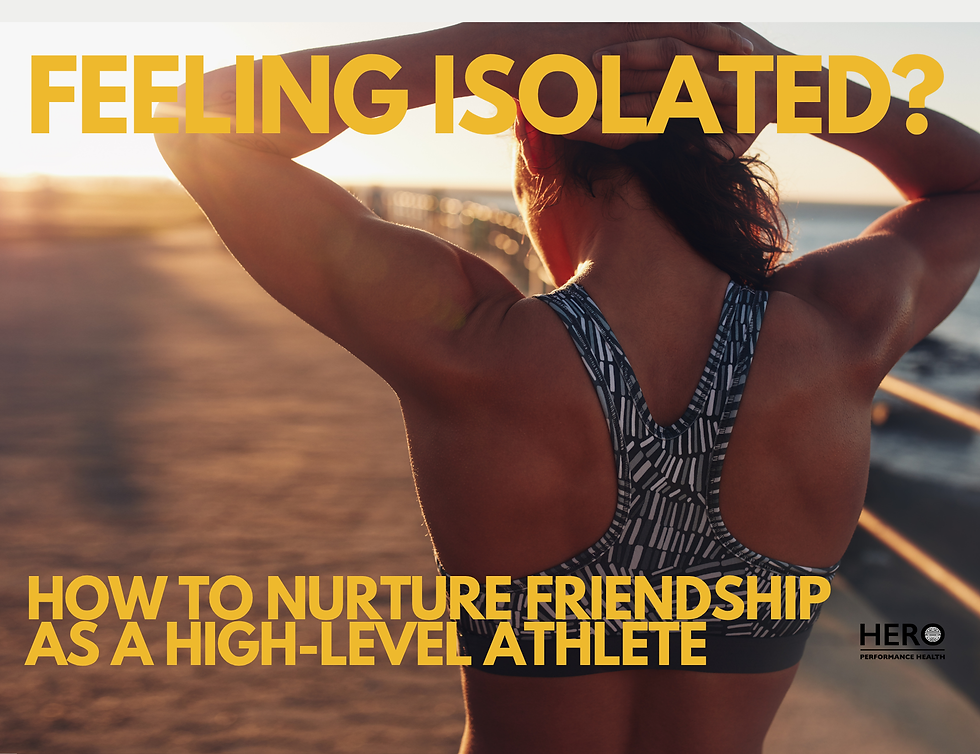Choosing the Right Support Team for Your High-Performance Journey
- Dr. Kyle Ryley

- Sep 9, 2025
- 4 min read

When you’re pushing your body and mind to perform at the highest level, one thing becomes clear: you can’t do it alone. Every elite athlete—from aspiring scholarship athletes to Olympians —relies on a strong support team to keep them healthy, confident, and progressing year after year.
But what does a “support team” really mean? And how do you choose the right people to be in yours?
Let’s break it down.
Why a Support Team Matters
In high-performance artistic sports like gymnastics, the demands on the body (and mind) are enormous. You’re training long hours, pushing technical limits, and constantly chasing higher goals.
Without the right support, even the most talented athletes risk:
Injuries that don’t heal fully
Chronic pain that gets brushed off as “normal”
Burnout from juggling school, training, and life
Plateaus in performance despite working harder
The truth is: coaches can’t do it all. They’re experts in technical skills and routines, but not always in injury prevention, recovery science, nutrition, or mental health.
That’s where your support team comes in.
The Core Members of a High-Performance Support Team
Every athlete’s team will look a little different, but these are the roles I recommend for most high-performance journeys:
1. Coach
Your coach is your guide for skills, strategy, and competition readiness. They set the vision for your sport-specific training. But remember: their focus is usually on performance outcomes—not necessarily on long-term health.
2. Medical + Recovery Experts
This is where things often get overlooked. A performance-oriented healthcare provider—someone who understands your sport’s unique demands—helps prevent injuries before they happen and gets you back to training if they do.
This can include:
A Traditional Chinese Medicine Doctor (DTCM) or sports therapist who specializes in holistic recovery and body balance.
A physiotherapist or athletic therapist who knows your sport’s movement patterns.
A massage therapist or bodyworker to address muscle tightness, imbalances, and recovery.
Without this piece, athletes often end up “training sore” or playing through pain until it becomes a bigger problem.
3. Strength & Conditioning Coach
Sport-specific training is great, but your body needs more. A strength coach who understands developmental stages and injury-prevention can build power, resilience, and efficiency outside your regular practice hours.
4. Nutritionist or Dietitian
Fuel is everything. A nutrition expert helps athletes learn how to eat for energy, performance, and recovery—without extremes or confusion.
5. Mindset Coach / Psychologist
Performance isn’t just physical—it’s mental. Fear of injury, performance anxiety, and confidence issues can hold athletes back as much as physical limitations. Having someone to help with visualization, stress management, and confidence is game-changing.
How to Choose the Right People
Not all professionals are created equal—and not every great practitioner is the right fit for you.
Here’s what to look for:
Sport-Specific Understanding - If your provider doesn’t understand the demands of your sport, you’ll spend too much time explaining instead of progressing. A gymnast’s back pain is not the same as a hockey player’s back pain.
Collaboration - Your team should communicate and respect each other’s roles. If your physio is telling you one thing and your coach another, you’re left confused and unsupported. The right team works together to keep you moving forward.
Preventative Mindset - Too many athletes only see healthcare providers after an injury. Look for people who emphasize proactive care—building strength, balance, and recovery strategies before something goes wrong.
Trust + Connection - At the end of the day, you need to feel comfortable with your team. If you don’t feel heard or understood, you won’t get the most out of their support.
Red Flags to Watch For
Sometimes, athletes (and parents) don’t realize they’re working with the wrong fit until issues pile up.
Watch for these warning signs:
They dismiss your pain as “normal” or tell you to just “push through it.”
They don’t respect your coach’s role or try to override their plan.
They give conflicting advice with no willingness to collaborate.
They make you feel judged, pressured, or unheard.
The right team builds you up. The wrong team slowly breaks you down.
Building Your Circle as a Young Athlete
If you’re an athlete or parent reading this and thinking, “We don’t have a full team like this,” don’t panic.
Most athletes build their team gradually. Start with what you need most right now.
If injuries keep popping up → start with a performance healthcare provider.
If strength is lagging → add a knowledgeable strength coach.
If nerves are holding you back → seek out mindset support.
Think of it as building blocks. Over time, you’ll have a circle of support that covers every part of your high-performance journey.
How HERO Athlete Program Fits In
This is exactly why I created the HERO Athlete Program. Too many gymnasts are expected to train like pros without the support pros have.
Inside HERO, athletes get:
Performance-oriented care that understands your sport.
A proactive plan for injury prevention and recovery.
Guidance on balancing training, recovery, and long-term health.
It’s about creating the foundation for a lifetime of performance—not just a season.
Final Thoughts
The most successful athletes aren’t the ones who train the most hours—they’re the ones with the strongest support systems.
Choosing the right team can be the difference between:
Peaking for a season and burning out,
or
Building a sustainable career with confidence, health, and joy.
You don’t need to figure this all out alone. Start building your team today.
👉 Ready to take the first step? Join the HERO Athlete Program waitlist by emailing us at info@heroperformancehealth.com and get the support your performance deserves.
Spots are limited—and they fill fast.
Train health. Be a HERO.




Comments